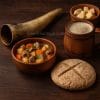
-
Shop by Type
-
Shop by Culture
-
Collections
Home » Blog » Mythology and Folklore » Freya: Goddess of War in Norse Mythology
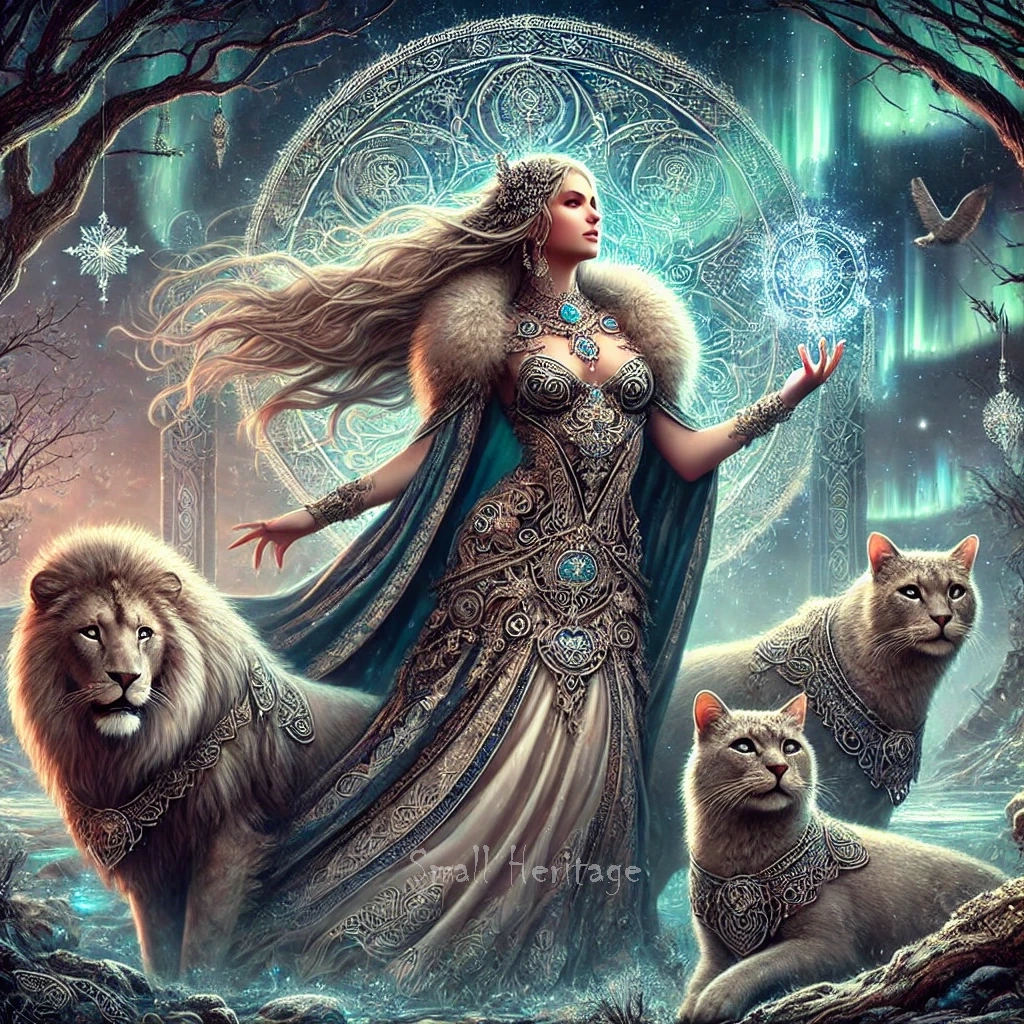
Freya: Goddess of War, love, and magic, is one of the most prominent deities in Norse mythology. Known for her beauty, power, and complex nature, Freya embodies a duality that blends the nurturing qualities of a fertility goddess with the fierce strength of a warrior. Although often associated with love and fertility, Freya is also deeply connected to war and death, making her one of the most multifaceted figures in Norse lore. Her mastery of seiðr magic and her role in choosing the fallen warriors who join her in Fólkvangr further emphasize her influence over both life and death.
In Norse mythology, Freya (sometimes spelled Freyja) is a member of the Vanir, one of the two primary groups of deities, the other being the Aesir. Freya is the daughter of Njord, the god of the sea, and the sister of Freyr, another prominent fertility god. After the war between the Aesir and Vanir gods, Freya became an honorary member of the Aesir tribe, living in Asgard.
Freya is primarily associated with love, beauty, and fertility, but she is also known for her association with war and death. In battle, she takes half of the slain warriors to her hall, Fólkvangr, while the other half go to Odin’s hall, Valhalla. This highlights her role not only as a goddess of life and fertility but also as one deeply connected to the afterlife and death.
Freya is also revered for her seiðr magic, a powerful form of Norse sorcery. She is considered a master of this type of magic, which involves prophecy, shape-shifting, and influencing the future. According to myth, Freya taught Odin this form of magic, showcasing her knowledge and power even over the chief of the gods.
Freya’s dual nature as a goddess of both life and death is particularly evident in her connection to war. Unlike Odin, who presides over Valhalla and is associated with the strategic and leadership aspects of warfare, Freya’s role in war is deeply emotional and personal. She selects half of the fallen warriors to join her in Fólkvangr, where they are honored and celebrated for their bravery in battle.
This association with the fallen warriors underscores Freya’s role in death and the afterlife. The warriors who join her in Fólkvangr are not just remnants of battle but are seen as noble souls who have earned a place in her hall. This role aligns Freya with the Valkyries, the female figures who choose those who will die and those who will live in battle. Her connection to these mythical women further cements her place as a powerful figure in Norse cosmology.
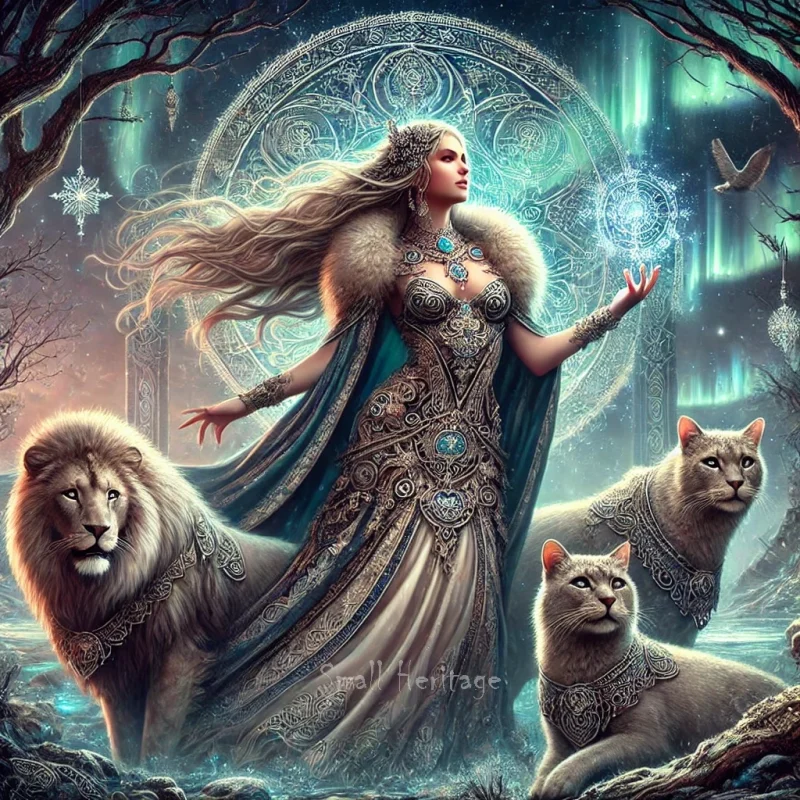
One of Freya’s most defining characteristics is her mastery of seiðr, an ancient form of Norse magic. Seiðr is often linked with fate and destiny, as it involves the ability to influence and foresee future events. Freya’s connection to this magic gives her the power to shape the course of destiny, making her one of the most influential deities in Norse mythology.
The practice of seiðr was often reserved for women, known as völvas, who were respected for their prophetic abilities. Freya’s expertise in seiðr positions her not only as a powerful goddess but also as a guide for mortals and gods alike in matters of fate. Her ability to teach Odin, the Allfather, this form of magic emphasizes her unparalleled wisdom and influence.
One of the most well-known stories involving Freya is her acquisition of the necklace Brísingamen, crafted by four dwarves. The necklace is described as one of the most beautiful objects in existence, and Freya desired it so much that she agreed to spend a night with each of the dwarves in exchange for the necklace.
Brísingamen is not only a symbol of Freya’s beauty but also of her association with wealth, power, and desire. It represents her connection to material wealth and her determination to obtain what she desires at any cost. This story highlights the complexity of Freya’s character, as she embodies both the nurturing qualities of a fertility goddess and the ambitious, powerful nature of a warrior and leader.
To explore jewelry inspired by Freya and other Norse symbols, visit our Viking Jewelry Collection.

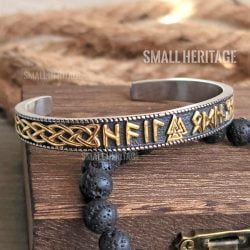
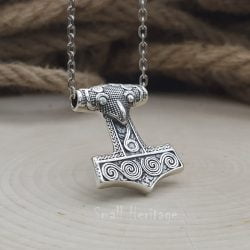
Freya is often celebrated as the goddess of love, beauty, and fertility. She is invoked by women seeking fertility, as well as by those seeking to find love or strengthen their romantic relationships. As a fertility goddess, Freya’s influence extends to the natural world, particularly in matters related to birth, growth, and renewal.
In Norse society, Freya was also a protector of women and children, and many rituals and sacrifices were made in her name to ensure a fruitful harvest or a successful childbirth. Her connection to fertility emphasizes her nurturing and life-giving attributes, making her one of the most beloved deities in Norse mythology.
Freya’s influence is not limited to ancient Norse culture. She has become an enduring figure in modern culture, with her image and stories appearing in literature, art, and even popular media. She represents a powerful symbol of femininity, strength, and independence, inspiring individuals who seek to connect with ancient mythology in contemporary ways.
In modern pagan and Wiccan practices, Freya is often invoked as a goddess of love and fertility, and her association with magic and prophecy continues to resonate with those who practice modern forms of witchcraft. Her dual role as a goddess of war and love speaks to the complexities of life and the balance between creation and destruction.
Freya, the Norse goddess of love, war, and magic, remains one of the most complex and fascinating figures in Norse mythology. Her dual nature as a goddess who presides over both life and death, fertility and war, highlights the rich tapestry of Norse beliefs. Freya’s mastery of seiðr magic, her connection to the fallen warriors of battle, and her role as a goddess of fertility make her a powerful and multifaceted deity.
Freya’s enduring legacy in modern culture continues to inspire people across the world. Whether as a symbol of beauty and love or as a fierce warrior and protector, Freya represents the balance of forces that shape the human experience, from the joys of love to the sorrows of loss.